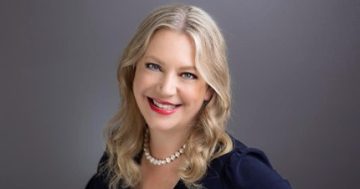Brad Johnson and David G. Smith* say that without the avid support of men, significant progress towards ending gender disparities is unlikely.

Photo: Xavier Arnau
Women’s conferences and employee resource groups (ERGs) are increasingly inviting men to attend.
By creating events aimed at men, they hope to include men in discussions around gender equity in the workplace and make organisational diversity efforts more successful.
The evidence shows that when men are deliberately engaged in gender inclusion programs, 96 per cent of organisations see progress — compared to only 30 per cent of organisations where men are not engaged.
But too many organisations still miss the mark on gender equity efforts by focusing gender initiatives solely on changing women.
Individualistic approaches to solving gender inequities overlook systemic structural causes and reinforce the perception that these are women’s issues — effectively telling men they don’t need to be involved.
Without the avid support of men — often the most powerful stakeholders in most large corporations — significant progress toward ending gender disparities is unlikely.
But including men in diversity efforts is not as simple as inviting them to a gender-equity event.
Sexism is a system, and while it’s a system that privileges men, it also polices male behaviour.
Understanding that is important to changing the system.
Challenges facing male allies
We define male allies as members of an advantaged group committed to building relationships with women, expressing as little sexism in their own behaviour as possible, understanding the social privilege conferred by their gender, and demonstrating active efforts to address gender inequities at work and in society.
Debra Meyerson and Megan Tompkins refer to such men as tempered radicals — they are catalysts for change, challenging organisational structures that disadvantage women while remaining committed to the success of the organisation.
While some research has shown that white men face no penalty for promoting diversity, other studies suggest that there can be a cost to acting as an ally.
First, there’s the dreaded wimp penalty.
New research reveals that men perceived as less self-promoting and more collaborative and power-sharing are evaluated by both men and women as less competent (and, not incidentally, less masculine).
Egalitarian men can feel the backlash effects of stigma-by-association — perceived as being similar to women by advocating for them.
Self-professed male allies can also face criticism from the women they try to ally with.
As two men who write and speak about cross-gender allyship and mentorship, we’ve noticed occasional backlash from women when dudes show up at women’s events.
Understandably, many women are initially sceptical about efforts to include men in women’s conferences and ERGs.
Breakout sessions for men at women’s events are often given labels such as “Manbassador Male Champion”, causing women to ask, “Really dude? We have to call you a champion just to get you to be fair, respectful, and inclusive?”
This Pedestal Effect in which men are given special treatment and shout outs for even small acts of gender equality is understandably grating for women.
There is also the problem of the Fake Male Feminist.
You know this guy.
He slings on feminism like a superhero cape when his boss is watching.
Finally, there is the sincere but utterly naive, ill-informed, or low-EQ man whose notion of allyship amounts to rescuing, mansplaining, or even attempting to become the spokesman for women in the organisation.
The allies male allies need
Women who want to dismantle sexist systems will be well-served by appreciating the wide variation among male allies and the factors most likely to help them get better at collaborating with women.
The more positive interaction men have with women in professional settings, the less prejudice and exclusion they tend to demonstrate.
Organisers of women’s initiatives who wish to engage male allies should also consider recent research on psychological standing.
Evidence reveals that gender-parity efforts are most effective when men believe they have a dignified and important role to play, that transformation is something they can share in.
Moreover, when allies feel accepted by the disadvantaged group they endeavour to support, their internal motivation to participate is bolstered.
How men can be better allies
Here are some tangible recommendations for men who are invited to participate in initiatives as allies for gender equality in the workplace.
First, just listen!
Consultant Chuck Shelton reminds men that listening to women’s voices in a way that inspires trust and respect is a fundamental relationship promise you must make, and then keep, with women who invite you to participate around equity.
Respect the space.
Women’s conferences and ERGs are often one outgrowth of experiences of exclusion, marginalisation, and discrimination.
Tread respectfully into these spaces and before you utter a word, revisit the recommendation above.
Remember, it’s not about you.
Ask women how you can amplify, not replace or usurp existing gender parity efforts.
A large dose of gender humility will help here.
Refrain from taking centre stage, speaking for women, or mansplaining how women should approach gender equity efforts.
Get comfortable being uncomfortable.
Developing psychological standing requires a commitment to learning and advocating for gender equity.
Learning about the professional challenges of women may produce feelings of shame or self-blame that cause anxiety.
The solution is more interaction and learning, not less.
Engage in supportive partnerships with women.
Share your social capital (influence, information, knowledge, and organisational resources) with women’s groups but ask them — don’t assume — how you can best support their efforts.
Remember the two parts to allyship.
Keep in mind that committing to express as little sexism as possible in your interactions with women is the easy part of allyship.
The hard part requires you to take informed action.
Use your experience in women’s events and initiatives to learn how you can best become a public ally for social justice around gender.
When the time comes, this may require you to upset the status quo.
* W. Brad Johnson is Professor of Psychology in the Department of Leadership, Ethics, and Law at the US Naval Academy and a Faculty Associate at Johns Hopkins University.
David G. Smith is Professor of Sociology in the Department of National Security Affairs at the US Naval War College.
This article first appeared at hbr.org.











